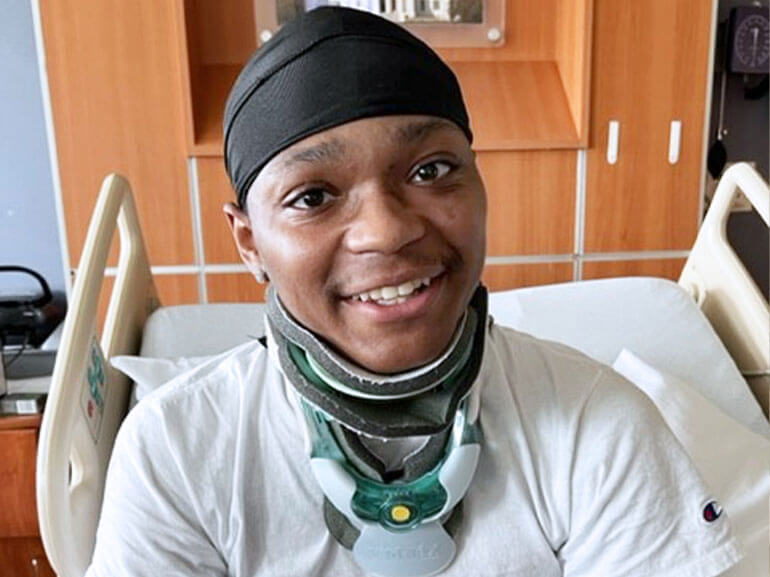Tyler's story

Tyler McElroy, 23, was finally finding his rhythm as a new father of a baby boy while juggling his job doing inventory and driving a forklift. The St. Louis native’s life changed in an instant when he was a passenger in a severe car accident. “I remember trying to grab my girlfriend,” Tyler recalls, “and I remember seeing my mother’s and grandmother’s faces.
Tyler was rushed to SSM Health DePaul Hospital where he underwent an MRI, CT scan and x-rays to determine the severity of his injuries. In addition to suffering a traumatic brain injury, Tyler had a bruised lung and multiple fractures, including his shoulder blade, ribs, two vertebra and his femur, which required surgery.
He would spend the next three weeks recovering in the hospital before his physicians decided that inpatient rehabilitation should be the next part of his journey. When Tyler arrived at SSM Health Rehabilitation Hospital – Bridgeton, he was still dealing with a lot of pain and wearing a cervical collar to support his neck while limiting mobility to relieve pain and pressure in the spine. Tyler also had a sling on his right arm and a splint on his left wrist. Unable to eat a normal diet, he was struggling to remember information and find his words due to his brain injury.
After undergoing a number of different clinical assessments, Tyler’s physician-led team of nurses and physical, occupational and speech therapists devised a care plan that would help him reach his goal of “getting back to my life and back to work."
On his first day of therapy, Tyler demonstrated to his physical therapists that he was able to walk very slowly with minimal assistance and could navigate two steps with slightly more assistance. Building on that, his physical therapy sessions focused on improving his balance and leg strength. Tyler was unable to bear weight on his right arm, but because of his brain injury, it was difficult for him to remember and required many reminders from his care team not to use it. Within a week, Tyler’s pain had improved and he was able to balance and walk more easily, only requiring the supervision of his therapists for safety.
Occupational therapists worked with Tyler on new ways to complete all of his daily activities due to his decreased strength and difficulty with sequencing, or completing an activity in the proper order. One day, it was “like a switch flipped” and Tyler’s disorientation improved allowing him to take on more challenging balance tasks. He made strong progress in a short amount of time, always smiling along the way at his accomplishments.
In speech therapy, Tyler’s therapists guided him through swallowing exercises so that he could move from eating only foods that were minced and moist to a normal diet. They also worked with Tyler on brain exercises to improve his memory and attention, focusing on word finding tasks. Therapists utilized the Virtualis Virtual Reality system to target and improve his memory and attention as well as his ability to process information. “I liked really liked using the Virtualis,” Tyler said. “It was very entertaining, helpful and fun."
Tyler says the turning point in his rehabilitation came when he was able to start walking and moving by himself and could handle more of his personal care. He credits his family and friends in playing an amazing role in his recovery, sharing “My girlfriend and little sister came to visit and just being able to see them was helpful. My friends kept me motivated by checking in regularly.”
Fifteen days after arriving at SSM Health Rehabilitation Hospital – Bridgeton, Tyler was ready to return home, where he planned to continue his recovery with outpatient therapy. At discharge, he was totally independent in walking and going up and down stairs. He was able to complete all of his personal care without assistance and was back to a regular diet. Tyler had also made great improvements with his memory and attention and planned to return to work as soon as possible.
Tyler says that his accident profoundly changed his outlook on life. “I look at everything on a larger scale now,” he says. “I appreciate everything more – my mom, family and girlfriend. I really appreciate the doctors and staff. Their energy helped make it easier for me to get better. I had a great experience.”